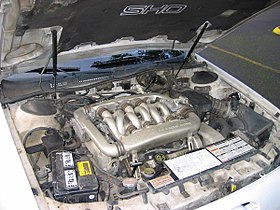Ford SHO V6 engine
| Ford SHO V6 | |
|---|---|
 |
|
| Overview | |
| Manufacturer | Yamaha Motor Corporation |
| Production | 1989–1995 |
| Combustion chamber | |
| Displacement | 2986 cc (182 CID) (3.0 L) 3191 cc (195 CID) (3.2 L) |
| Cylinder bore | 89 mm (3.5 in.) (3.0 L) 92 mm (3.6 in.) (3.2 L) |
| Piston stroke | 80 mm (3.1 in.) |
| Cylinder block alloy | Iron |
| Cylinder head alloy | Aluminum |
| Valvetrain | DOHC |
| Combustion | |
| Fuel type | Gasoline |
| Output | |
| Power output | 220 hp (164 kW) at 6200 rpm (3.0 L) 220 hp (164 kW) at 6000 rpm (3.2 L) |
| Torque output | 200 lb·ft (271 N·m) at 4800 rpm (3.0 L) 215 lb·ft (291 N·m) at 4000 rpm (3.2 L) |
| Chronology | |
| Successor | Ford SHO V8 |
The Ford SHO V6 is a family of DOHC V6 engines fitted to the Ford Taurus SHO from 1989 to 1995. The designation SHO denotes Super High Output.
Due to the engine's unusual and aesthetically pleasing appearance it is sometimes transplanted into other vehicles. Its distinctive variable length intake manifold is bilaterally symmetrical, so it can be rotated 180 degrees (making it face "backwards" on the engine, relative to its original installation orientation) to ease the engine's transition from transverse to longitudinal mounting.
The SHO engines share a common bell housing pattern with the following Ford engines: the 2.3/2.5 L FWD HSC I4, the 3.0 L FWD/RWD Vulcan V6, and the 3.8 L FWD Canadian Essex V6. In 1996, Ford discontinued the SHO V6 and began fitting the Taurus SHO's with the SHO 3.4 L V8 and the Ford AX4N automatic transmission.
In 1984, executives of the Yamaha Motor Corporation signed a contract with the Ford Motor Company to develop, produce, and supply a compact 60° DOHC V6 engine based upon the existing Vulcan engine for transverse application.
There has been some confusion about the original intended use of the engine. It was thought this engine was first intended to power a mid-engine sports car, that project (known internally as GN34) was canceled. Patents have been found and pictures of prototype SHO powerplants installed in the Taurus show that the original intent was for the larger FWD setup and the GN34 would have come later. There were a few GN34 prototypes produced, most with standard Vulcan engines and a few other factory swaps, a SHO Ranger being one.
...
Wikipedia
